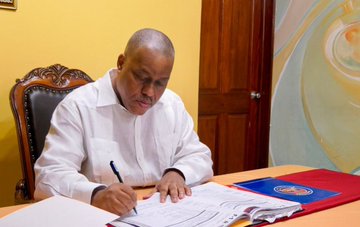Haitian Prime Minister Garry Conille has been dismissed by the nation’s ruling council, less than six months after assuming office.
An executive order, signed by eight of the council’s nine members, appointed businessman and former Senate candidate Alix Didier Fils-Aime as Conille’s successor.
Conille, a former United Nations official, was originally brought in to navigate Haiti through a gang-driven security crisis and to facilitate the country’s first presidential elections since 2016.
He called his dismissal unlawful, expressing in a letter—viewed by Reuters—that it raised “serious concerns” for Haiti’s future.
Currently, Haiti lacks both a president and parliament, and, per its constitution, only the latter has the authority to remove a sitting prime minister.
Conille was sworn into office on June 3.
“This resolution, taken outside any legal and constitutional framework, raises serious concerns about its legitimacy,” Conille’s letter was quoted as saying.
Haiti’s transitional presidential council (TPC) was created in April after Ariel Henry, Conille’s predecessor, was forced from office by a network of gangs that had taken over parts of the capital Port-au-Prince.
Henry left Haiti for a summit in Guyana on February 25, 2024, after which gang members seized control of the country’s international airport, blocking his return.
The Transitional Presidential Council (TPC) was assigned the responsibility of restoring democratic order in Haiti, a nation plagued by widespread violence.
According to the UN, more than 3,600 people have been killed in Haiti since January, and over 500,000 have been displaced. The UN also reports that two million Haitians currently face emergency hunger levels, with nearly half of the population struggling to access enough food.
Jimmy Chérizier, a powerful gang leader known as Barbecue, has previously stated he would consider ending the violence if armed groups were included in discussions to form a new government.
Haiti’s last presidential election took place eight years ago, when Jovenel Moïse of the Tèt Kale party was elected. Since his assassination in July 2021, the presidency has remained vacant.
Gangs have taken advantage of this power vacuum, expanding their influence and rendering parts of the country lawless.
Recently, hundreds of Kenyan police officers were deployed to Haiti, with additional forces expected to arrive in November.



